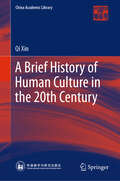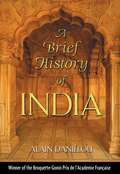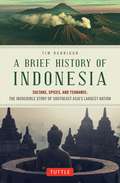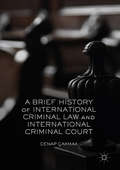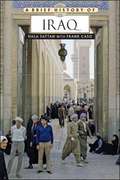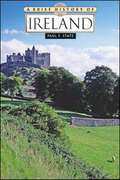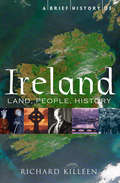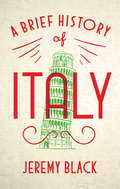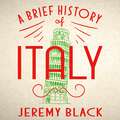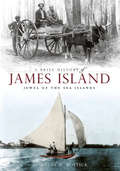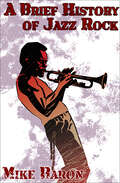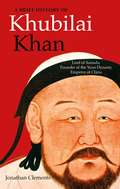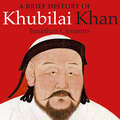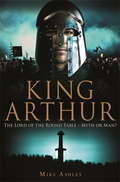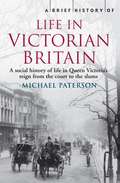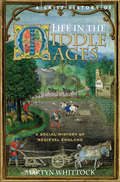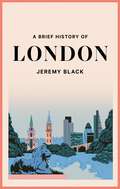- Table View
- List View
A Brief History of Human Culture in the 20th Century (China Academic Library)
by Qi XinThis book examines the cultural concepts that guided the development of the “age of mankind”— the changes that took place in historical, philosophical, scientific, religious, literary, and artistic thought in the 20th century. It discusses a broad range of major topics, including the spread of commercial capitalism; socialist revolutions; the two world wars; anti-colonialist national liberation movements; scientific progress; the clashes and fusion of Eastern and Western cultures; globalization; women’s rights movements; mass media and entertainment; the age of information and the digital society. The combination of cultural phenomena and theoretical descriptions ensures a unity of culture, history and logic. Lastly, the book explores the enormous changes in lifestyles and the virtualized future, revealing cultural characteristics and discussing 21st -century trends in the context of information technology, globalization and the digital era.
A Brief History of Image Science and Technology in China
by Congyao HanThis book, within the vision of the study on the image history, clearly manifests the development of Chinese image science and technology of over 2000 years based on compendium, while having briefly sorted out expositions by scientists since ancient times in China, demonstrates the spiritual course, ideas of thinking and forms of life and reveales profound humane ideas, basis of sentiments and styles of the spirit featured by Chinese image culture. The historic outline of images is clear-cut along with authenticated inter-attestation for clues of images and texts. Historic facts concerning images are ecologically diversified, while historic documents about images are properly chosen, in addition to the integration between liberal arts and science and perfect combination between images and texts. Blessed with nice integration between images and texts, this book serves as reference to experts, scholars, undergraduates and postgraduates related to the study on image history, history of science and technology, study of history and news communication.
A Brief History of India
by Alain Daniélou Kenneth F. HurryDaniélou's powerful rebuttal to the conventional view of India's history, which calls for a massive reevaluation of the history of humanity• Explores historical occurrences from each major time period starting with the first appearance of man 30,000 years ago• Couples the clarity and perspective of an outsider with the unique and specific knowledge of an insider• By the internationally recognized Hindu scholar and translator of The Complete Kama Sutra (200,000 copies sold)Alain Daniélou approaches the history of India from a new perspective--as a sympathetic outsider, yet one who understands the deepest workings of the culture. Because the history of India covers such a long span of time, rather than try to create an exhaustive chronology of dates and events, Daniélou instead focuses on enduring institutions that remain constant despite the ephemeral historical events that occur. His selections, synthesis, and narration create a thoroughly engaging and readable journey through time, with a level of detail and comprehensiveness that is truly a marvel.Because of the continuity of its civilization, its unique social system, and the tremendous diversity of cultures, races, languages, and religions that exist in its vast territory, India is like a history museum. Its diverse groups maintained their separate identities and never fully supplanted the culture and knowledge of their predecessors. Even today one may encounter in India primitive Stone Age people whose technology has remained at what is considered prehistoric levels. Thus Daniélou's examination of India reveals not only the diversity and historical events and trends of that country, but also the history of all mankind. Through Daniélou's history of India we learn from whence we came, what we have discovered over the years in the fields of science, arts, technology, social structures, religions, and philosophical concepts, and what the future may hold for us.
A Brief History of Indonesia
by Tim HanniganSultans, Spices, and Tsunamis: The Incredible Story of the World's Largest Archipelago Indonesia is by far the largest nation in Southeast Asia and has the fourth largest population in the world after the United States. Indonesian history and culture are especially relevant today as the Island nation is an emerging power in the region with a dynamic new leader. It is a land of incredible diversity and unending paradoxes that has a long and rich history stretching back a thousand years and more. Indonesia is the fabled "Spice Islands" of every school child's dreams—one of the most colorful and fascinating countries in history. These are the islands that Europeans set out on countless voyages of discovery to find and later fought bitterly over in the 15th, 16th and 17th centuries. This was the land that Christopher Columbus sought and Magellan actually reached and explored. One tiny Indonesian island was even exchanged for the island of Manhattan in 1667! This fascinating book tells the story of Indonesia as a narrative of kings, traders, missionaries, soldiers and revolutionaries, featuring stormy sea crossings, fiery volcanoes, and the occasional tiger. It recounts the colorful visits of foreign travelers who have passed through these shores for many centuries—from Chinese Buddhist pilgrims and Dutch adventurers to English sea captains and American movie stars. For readers who want an entertaining introduction to Asia's most fascinating country, this is delightful reading.
A Brief History of Indonesia
by Tim HanniganSultans, Spices, and Tsunamis: The Incredible Story of the World's Largest ArchipelagoIndonesia is by far the largest nation in Southeast Asia and has the fourth largest population in the world after the United States. Indonesian history and culture are especially relevant today as the Island nation is an emerging power in the region with a dynamic new leader. It is a land of incredible diversity and unending paradoxes that has a long and rich history stretching back a thousand years and more.Indonesia is the fabled "Spice Islands" of every school child's dreams-one of the most colorful and fascinating countries in history. These are the islands that Europeans set out on countless voyages of discovery to find and later fought bitterly over in the 15th, 16th and 17th centuries. This was the land that Christopher Columbus sought and Magellan actually reached and explored. One tiny Indonesian island was even exchanged for the island of Manhattan in 1667!This fascinating book tells the story of Indonesia as a narrative of kings, traders, missionaries, soldiers and revolutionaries, featuring stormy sea crossings, fiery volcanoes, and the occasional tiger. It recounts the colorful visits of foreign travelers who have passed through these shores for many centuries-from Chinese Buddhist pilgrims and Dutch adventurers to English sea captains and American movie stars. For readers who want an entertaining introduction to Asia's most fascinating country, this is delightful reading.
A Brief History of International Criminal Law and International Criminal Court
by Cenap ÇakmakThis book offers a historical presentation of how international criminal law has evolved from a national setting to embodying a truly international outlook. As a growing part of international law this is an area that has attracted growing attention as a result of the mass atrocities and heinous crimes committed in different parts of the world. Çakmak pays particular attention to how the first permanent international criminal court was created and goes on to show how solutions developed to address international crimes have remained inadequate and failed to restore justice. Calling for a truly global approach as the only real solution to dealing with the most severe international crimes, this text will be of great interest to scholars of criminal justice, political science, and international relations.
A Brief History of Iraq
by Hala Fattah Hala Mundhir Fattah Frank CasoFattah (world history, American Community School, Jordan) and Caso (writer and editor) offer a comprehensive view of Iraq, a region once far from the minds of almost everyone but its residents, and now a daily source of news and debate. The book begins with Iraq's Mesopotamian origins and concludes with the 2003 U.S. invasion and the end of Saddam Hussein. It explores the country in terms of its ethnicities, religions and sects, national groups, adaptation, acculturation, interaction, and growth. Annotation ©2009 Book News, Inc., Portland, OR (booknews.com)
A Brief History of Ireland
by Paul E. StateA Brief History of Ireland provides a broad narrative of the central events that have shaped the country, from the arrival of the Celts to recent economic developments that have brought booming prosperity and social change. The geographical proximity of Great Britain and a strained relationship between the peoples of the two isles had a profound impact on Irish development, culminating in the forced absorption of Ireland into Great Britain in 1801. The Irish struggled to retain their separate ethnic identity defined by a distinctive language and cultural traditions and their Roman Catholic faith-and resolved to win independence. For more than a century, Ireland became hostage to the religious discord, outbreaks of armed rebellion, social and political instability, and famines that plagued the nation and its people. The Irish managed to survive, and, ultimately, they succeeded in securing their dream of national self-identity. Now a democratic and prosperous nation open to the world, modern Ireland is a synthesis of both Irish and English heritages.
A Brief History of Ireland (Brief Histories )
by Richard KilleenFrom the dawn of history to the decline of the Celtic Tiger - how Ireland has been shaped over the centuries.Ireland has been shaped by many things over the centuries: geography, war, the fight for liberty. A Brief History of Ireland is the perfect introduction to this exceptional place, its people and its culture.Ireland has been home to successive groups of settlers - Celts, Vikings, Normans, Anglo-Scots, Huguenots. It has imported huge ideas, none bigger than Christianity which it then re-exported to Europe after the fall of the Roman Empire. In the Tudor era it became the first colony of the developing English Empire. Its fraught and sometimes brutal relationship with England has dominated its modern history. Killeen argues that religion was decisive in all this: Ireland remained substantially Catholic, setting it at odds with the larger island culturally, religiously and politically. But its own culture and identity have stayed strong, most obviously in literature with a magnificent tradition of writing from the Book of Kells to the modern masters: Joyce, Yeats, Beckett and Heaney.
A Brief History of Ireland (Brief Histories)
by Richard KilleenFrom the dawn of history to the decline of the Celtic Tiger - how Ireland has been shaped over the centuries.Ireland has been shaped by many things over the centuries: geography, war, the fight for liberty. A Brief History of Ireland is the perfect introduction to this exceptional place, its people and its culture.Ireland has been home to successive groups of settlers - Celts, Vikings, Normans, Anglo-Scots, Huguenots. It has imported huge ideas, none bigger than Christianity which it then re-exported to Europe after the fall of the Roman Empire. In the Tudor era it became the first colony of the developing English Empire. Its fraught and sometimes brutal relationship with England has dominated its modern history. Killeen argues that religion was decisive in all this: Ireland remained substantially Catholic, setting it at odds with the larger island culturally, religiously and politically. But its own culture and identity have stayed strong, most obviously in literature with a magnificent tradition of writing from the Book of Kells to the modern masters: Joyce, Yeats, Beckett and Heaney.
A Brief History of Italy: Indispensable for Travellers
by Jeremy BlackDespite the Roman Empire's famous 500-year reign over Europe, parts of Africa and the Middle East, Italy does not have the same long national history as states such as France or England. Divided for much of its history, Italy's regions have been, at various times, parts of bigger, often antagonistic empires, notably those of Spain and Austria. In addition, its challenging and varied terrain made consolidation of political control all the more difficult. This concise history covers, in very readable fashion, the formative events in Italy's past from the rise of Rome, through a unified country in thrall to fascism in the first half of the twentieth century right up to today. The birthplace of the Renaissance and the place where the Baroque was born, Italy has always been a hotbed of culture. Within modern Italy country there is fierce regional pride in the cultures and identities that mark out Tuscany, Rome, Sicily and Venice to name just a few of Italy's many famous regions. Jeremy Black draws on the diaries, memoirs and letters of historic travellers to Italy to gain insight into the passions of its people, first chronologically then regionally. In telling Italy's story, Black examines what it is that has given Italians such cultural clout - from food and drink, music and fashion, to art and architecture - and explores the causes and effects of political events, and the divisions that still exist today.
A Brief History of Italy: Indispensable for Travellers
by Jeremy Black'Jeremy Black skilfully sketches social, cultural and political trends' - Christina Hardyment, Times audiobook of the week'A remarkable mixture of cold history, wide culture and personal experience'Ciro Paoletti, Secretary General of the Italian Commission of Military HistoryDespite the Roman Empire's famous 500-year reign over Europe, parts of Africa and the Middle East, Italy does not have the same long national history as states such as France or England. Divided for much of its history, Italy's regions have been, at various times, parts of bigger, often antagonistic empires, notably those of Spain and Austria. In addition, its challenging and varied terrain made consolidation of political control all the more difficult. This concise history covers, in very readable fashion, the formative events in Italy's past from the rise of Rome, through a unified country in thrall to fascism in the first half of the twentieth century right up to today. The birthplace of the Renaissance and the place where the Baroque was born, Italy has always been a hotbed of culture. Within modern Italy country there is fierce regional pride in the cultures and identities that mark out Tuscany, Rome, Sicily and Venice to name just a few of Italy's many famous regions. Jeremy Black draws on the diaries, memoirs and letters of historic travellers to Italy to gain insight into the passions of its people, first chronologically then regionally. In telling Italy's story, Black examines what it is that has given Italians such cultural clout - from food and drink, music and fashion, to art and architecture - and explores the causes and effects of political events, and the divisions that still exist today.
A Brief History of Italy: Indispensable for Travellers
by Jeremy Black'Jeremy Black skilfully sketches social, cultural and political trends' - Christina Hardyment, Times audiobook of the week'A remarkable mixture of cold history, wide culture and personal experience'Ciro Paoletti, Secretary General of the Italian Commission of Military HistoryDespite the Roman Empire's famous 500-year reign over Europe, parts of Africa and the Middle East, Italy does not have the same long national history as states such as France or England. Divided for much of its history, Italy's regions have been, at various times, parts of bigger, often antagonistic empires, notably those of Spain and Austria. In addition, its challenging and varied terrain made consolidation of political control all the more difficult. This concise history covers, in very readable fashion, the formative events in Italy's past from the rise of Rome, through a unified country in thrall to fascism in the first half of the twentieth century right up to today. The birthplace of the Renaissance and the place where the Baroque was born, Italy has always been a hotbed of culture. Within modern Italy country there is fierce regional pride in the cultures and identities that mark out Tuscany, Rome, Sicily and Venice to name just a few of Italy's many famous regions. Jeremy Black draws on the diaries, memoirs and letters of historic travellers to Italy to gain insight into the passions of its people, first chronologically then regionally. In telling Italy's story, Black examines what it is that has given Italians such cultural clout - from food and drink, music and fashion, to art and architecture - and explores the causes and effects of political events, and the divisions that still exist today.
A Brief History of James Island: Jewel of the Sea Islands (Brief History)
by Douglas W. BostickIn this engaging volume, local historian Douglas Bostick reveals the unacknowledged history of the second community in South Carolina, settled in 1671. Whether investigating prehistoric clues about Native American life before European settlement, detailing the history of agriculture and the reign of King Cotton, following armies from multiple wars or chronicling the triumph of equality on the greens of Charleston's Municipal Golf Course, Bostick tells the story of James Island as only a native son can. Join Bostick as he brings this small jewel of an island out of Charleston's shadow and into the light of its own rich, historic assets.
A Brief History of Jazz Rock
by Mike BaronJazz rock flourished from 1968 to 1974, offering a distinctively cool and innovative hybrid sound that captivated a generation—and beyond. Superstar bands like Blood, Sweat and Tears and Chicago have earned their place in popular consciousness, but the movement included many other powerful, innovative groups such as Tower of Power and Malo. Author Mike Baron explores the history of this music fusion, its rise and fall in popularity. He offers highlights—and his own unique insights from a front-row seat in jazz rock—into what made the era so special. A Brief History of Jazz Rock is a sax-meets-Strat bible that dares to inspire a Renaissance—to cultivate a new generation of musicians who might mix brass with bass, and help return forgotten bands like If and Dreams to their place on the main stage.
A Brief History of Khubilai Khan: Lord of Xanadu, Founder of the Yuan Dynasty, Emperor of China
by Jonathan ClementsHis grandfather was the bloodthirsty Mongol leader Genghis Khan, his mother a Christian princess. Groomed from childhood for a position of authority, Khubilai snatched the position of Great Khan, becoming the overlord of a Mongol federation that stretched from the Balkans to the Korean coastline. His armies conquered the Asian kingdom of Dali and brought down the last defenders of imperial China.Khubilai Khan presided over a glorious Asian renaissance, attracting emissaries from all across the continent, and opening his civil service to 'men with coloured eyes' - administrators from the far west. His life and times encompassed the legends of Prester John, the pinnacle of the samurai (and, indeed, the Mongols), and the travels of Marco Polo.
A Brief History of Khubilai Khan: Lord of Xanadu, Founder of the Yuan Dynasty, Emperor of China (Brief Histories)
by Jonathan ClementsHis grandfather was the bloodthirsty Mongol leader Genghis Khan, his mother a Christian princess. Groomed from childhood for a position of authority, Khubilai snatched the position of Great Khan, becoming the overlord of a Mongol federation that stretched from the Balkans to the Korean coast. His armies conquered the Asian kingdom of Dali and brought down the last defenders of imperial China.Khubilai Khan presided over a glorious Asian renaissance, attracting emissaries from all across the continent, and opening his civil service to 'men with coloured eyes' - administrators from the far west. His reign began the glorious Yuan dynasty that ruled over China for only ninety years, but had a profound impact on Asian history, from international trade to cultural revolution. Jonathan Clements's insightful biography into the life and times of one of China's greatest leaders is a fascinating introduction to an important era, uncovering the man behind Marco Polo's mythic portrait.
A Brief History of Khubilai Khan: Lord of Xanadu, Founder of the Yuan Dynasty, Emperor of China (Brief Histories)
by Jonathan ClementsHis grandfather was the bloodthirsty Mongol leader Genghis Khan, his mother a Christian princess. Groomed from childhood for a position of authority, Khubilai snatched the position of Great Khan, becoming the overlord of a Mongol federation that stretched from the Balkans to the Korean coast. His armies conquered the Asian kingdom of Dali and brought down the last defenders of imperial China.Khubilai Khan presided over a glorious Asian renaissance, attracting emissaries from all across the continent, and opening his civil service to 'men with coloured eyes' - administrators from the far west. His reign began the glorious Yuan dynasty that ruled over China for only ninety years, but had a profound impact on Asian history, from international trade to cultural revolution. Jonathan Clements's insightful biography into the life and times of one of China's greatest leaders is a fascinating introduction to an important era, uncovering the man behind Marco Polo's mythic portrait.
A Brief History of King Arthur
by Mike AshleyWho was the real King Arthur? What do the historical documents tell us about the Knight of the Round Temple? It is just a chivalric fantasy? The story of Arthur has been handed down to us by Medieval poets and legends - but what if he actually existed and was in fact a great king in the early years of Britain's story. Mike Ashley visits the source material and uncovers unexpected new insights into the legend: there is clear evidence that the Arthurian legends arose from the exploits of not just one man, but at least three originating in Wales, Scotland and Brittany. The true historical Arthur really existed and is distantly related to the present royal family.
A Brief History of King Arthur (Brief Histories)
by Mike AshleyWho was the real King Arthur? What do the historical documents tell us about the Knight of the Round Temple? It is just a chivalric fantasy? The story of Arthur has been handed down to us by Medieval poets and legends - but what if he actually existed and was in fact a great king in the early years of Britain's story. Mike Ashley visits the source material and uncovers unexpected new insights into the legend: there is clear evidence that the Arthurian legends arose from the exploits of not just one man, but at least three originating in Wales, Scotland and Brittany. The true historical Arthur really existed and is distantly related to the present royal family.
A Brief History of Life in Victorian Britain
by Michael PatersonThe Victorian era has dominated the popular imagination like no other period, but these myths and stories also give a very distorted view of the 19th century. The early Victorians were much stranger that we usually imagine, and their world would have felt very different from our own and it was only during the long reign of the Queen that a modern society emerged in unexpected ways. Using character portraits, events, and key moments Paterson brings the real life of Victorian Britain alive - from the lifestyles of the aristocrats to the lowest ranks of the London slums. This includes the right way to use a fan, why morning visits were conducted in the afternoon, what the Victorian family ate and how they enjoyed their free time, as well as the Victorian legacy today - convenience food, coffee bars, window shopping, mass media, and celebrity culture.Praise for Dicken's London:Out of the babble of voices, Michael Paterson has been able to extract the essence of London itself. Read this book and re-enter the labyrinth of a now-ancient city.' Peter Ackroyd
A Brief History of Life in Victorian Britain (Brief Histories)
by Michael PatersonThe Victorian era has dominated the popular imagination like no other period, but these myths and stories also give a very distorted view of the 19th century. The early Victorians were much stranger that we usually imagine, and their world would have felt very different from our own and it was only during the long reign of the Queen that a modern society emerged in unexpected ways. Using character portraits, events, and key moments Paterson brings the real life of Victorian Britain alive - from the lifestyles of the aristocrats to the lowest ranks of the London slums. This includes the right way to use a fan, why morning visits were conducted in the afternoon, what the Victorian family ate and how they enjoyed their free time, as well as the Victorian legacy today - convenience food, coffee bars, window shopping, mass media, and celebrity culture.Praise for Dicken's London:Out of the babble of voices, Michael Paterson has been able to extract the essence of London itself. Read this book and re-enter the labyrinth of a now-ancient city.' Peter Ackroyd
A Brief History of Life in the Middle Ages
by Martyn WhittockUsing wide-ranging evidence, Martyn Whittock shines a light on Britain in the Middle Ages, bringing it vividly to life. Thus we glimpse 11th century rural society through a conversation between a ploughman and his master.The life of Dick Whittington illuminates the rise of the urban elite. The stories of Roger 'the Raker' who drowned in his own sewage, a 'merman' imprisoned in Orford Castle and the sufferings of the Jews of Bristol reveal the extraordinary diversity of medieval society. Through these characters and events - and using the latest discoveries and research - the dynamic and engaging panorama of medieval England is revealed.Interesting facts include:When the life expectancy for women dropped to 26 years in Sierra Leone in 2002, following a catastrophic civil war, it was one year longer than the estimate for early medieval women.So great was the extent of church construction in the thirteenth century that it has been calculated it was the equivalent, in modern terms, of every family in England paying £500 every year, for the whole century!Murder rates for East Anglia, in the fourteenth century, were comparable with those of modern New York. For England generally the homicide rate was far higher than that of the urban USA today.
A Brief History of Life in the Middle Ages (Brief Histories)
by Martyn WhittockUsing wide-ranging evidence, Martyn Whittock shines a light on Britain in the Middle Ages, bringing it vividly to life in this fascinating new portrait that brings together the everyday and the extraordinary.Thus we glimpse 11th-century rural society through a conversation between a ploughman and his master.The life of Dick Whittington illuminates the rise of the urban elite. The stories of Roger 'the Raker' who drowned in his own sewage, a 'merman' imprisoned in Orford Castle and the sufferings of the Jews of Bristol reveal the extraordinary diversity of medieval society. Through these characters and events - and using the latest discoveries and research - the dynamic and engaging panorama of medieval England is revealed.
A Brief History of London (Brief Histories)
by Jeremy BlackAs the United Kingdom left the European Union, during a period of international and domestic turmoil, London found itself at a turning point. This critical moment presents an opportunity to look back, with a distinctive perspective, a focus on London in its national and, perhaps even more importantly, its international contexts, rather than on the city itself in isolation. It is the interactions of London that Black considers, and he does so in order to address the question as to why London became the foremost international city, how it sustained that position, and what its future holds. The book is as much about economics and culture as it is about politics and society. It deals with migration, communications, empire and cultural energy, rather than the mechanisms of parish vestries. London's earlier period is covered, but the principal focus is on the last half millennium, the period during which London became a major trader with the trans-oceanic world, and the ruler of trans-oceanic colonies, while the English language became an increasingly important cultural medium, one centred on London.The book includes plentiful literary references, quotations from visitors, and boxes covering discrete topics, such as Jack the Ripper.
